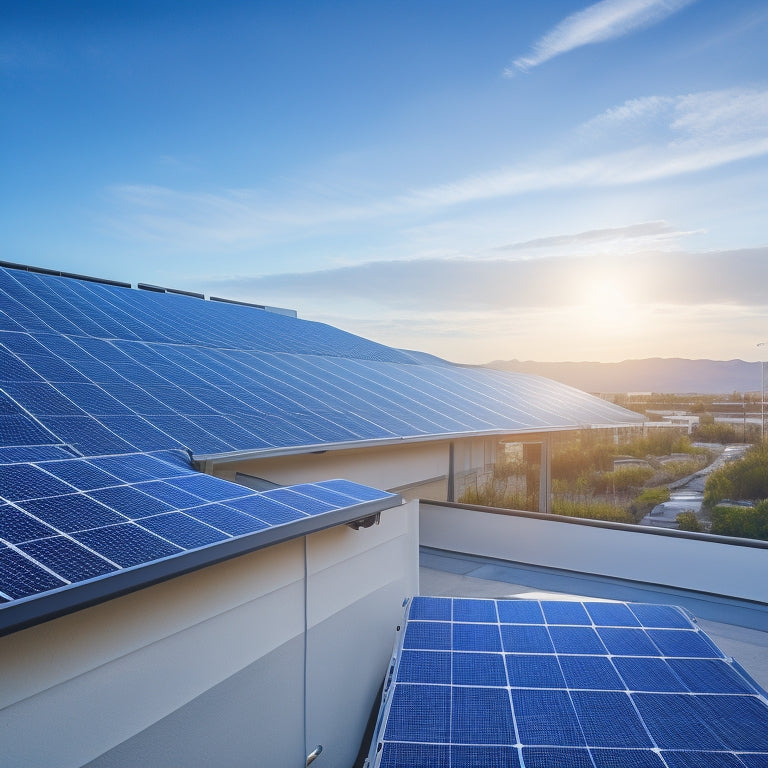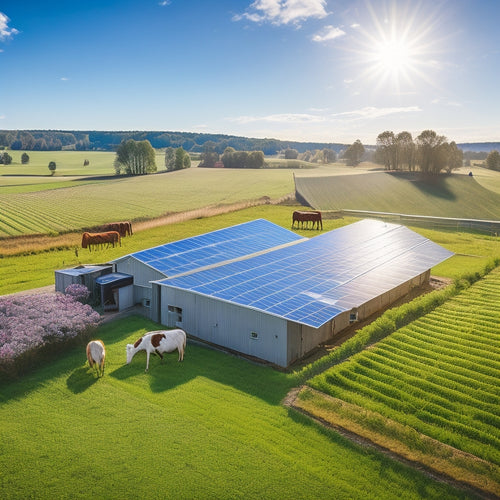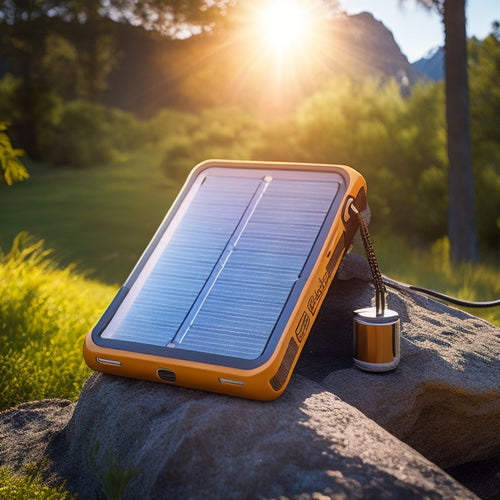
Solar Panels With Backup Battery
Share
You're investing in solar panels with a backup battery to guarantee reliable power during outages, maximize your solar energy investment, and take a significant step towards energy independence. This integration allows essential appliances to remain operational during grid failures, providing peace of mind during emergencies. By storing excess energy generated from solar panels, you'll reduce your reliance on the grid and lower your energy bills. With the right deep cycle battery technology and inverter compatibility, you'll be able to optimize your energy usage and storage. As you investigate the world of solar panels with backup batteries, you'll uncover the many ways to customize and enhance your system to meet your specific energy needs.
The Essentials
- Solar panels with backup battery integration ensure power availability during outages, maximizing solar energy investment and promoting sustainable living.
- High-quality batteries like Tesla Powerwall provide reliable energy storage, allowing essential appliances to remain operational during grid failures.
- Backup power systems seamlessly transition to battery backup during outages, supporting daily life activities and enhancing energy independence.
- Efficient energy storage and usage are achieved through advanced technology, minimizing energy waste and reducing grid reliance.
- Proper battery selection, maintenance, and charging techniques are crucial for maximizing battery lifespan and overall system performance.
Reliable Power During Outages
You expect your solar panel system to provide power when you need it most, and that's exactly what it does with a backup battery.
By integrating a high-quality house solar battery, such as the Tesla Powerwall, you can maximize your solar energy investment and optimize your energy consumption.
During outages, the battery kicks in to guarantee you have a reliable source of energy, keeping your essential appliances running smoothly.
With a solar panel system and backup battery, you can rest assured you'll have outage protection assured.
Power When You Need
During prolonged power outages, homeowners often find themselves at the mercy of utility companies, waiting for the lights to come back on. But with a solar panel system paired with a backup battery, you can take control of your energy needs and enjoy reliable power when you need it most.
| Scenario | Utility-Only Home | Solar + Battery Home |
|---|---|---|
| Power Outage | No power, waiting for utility repair | Power stays on, using stored energy |
| Daytime Energy | Importing energy from grid | Generating energy from solar panels |
| Nighttime Energy | Importing energy from grid | Using stored energy from battery |
With a backup battery, you can store excess energy generated by your solar panels during the day and use it at night or during an outage. This means you'll have power when you need it, without relying on the grid. By choosing a solar panel system with a backup battery, you're taking an essential step towards energy independence and sustainable living. You'll be able to power your home with clean energy, reduce your reliance on fossil fuels, and enjoy the freedom that comes with being in control of your energy needs.
Outage Protection Guaranteed
With backup power at your fingertips, outages become a thing of the past, as your solar panel system with a battery guarantees that essential appliances and lights stay on, even when the grid goes dark.
You'll enjoy uninterrupted power supply, thanks to the advanced technology that seamlessly switches to battery backup during outages. This means you can keep your refrigerator running, your lights on, and your communication devices charged, ensuring your daily life remains unaffected.
By integrating a battery storage system into your solar setup, you'll reveal the full potential of renewable energy and create a more sustainable, dependable, and cost-effective power solution.
You'll experience true solar resilience, where your solar panel system continues to generate power even when the grid is down. This energy independence gives you the freedom to live life on your own terms, without worrying about power outages disrupting your routine.
The backup battery provides a reliable source of energy, ensuring your safety and comfort during extended outages.
With a solar panel system and backup battery, you're in control of your power supply, enjoying the peace of mind that comes with knowing you're prepared for any situation.
Reduced Energy Waste
When you integrate a backup battery with your solar panels, you'll experience reduced energy waste through efficient energy storage.
This means you'll be able to store excess energy generated during the day for use at night or during power outages.
By using a Deep Cycle Batteries and an inverter charger, you'll be able to optimize your power usage and minimize energy loss.
Efficient Energy Storage
By integrating a backup battery into your solar panel system, you'll greatly reduce energy waste by storing excess energy generated during the day for use at night or during power outages.
This efficient energy storage solution allows you to utilize the full potential of your solar panels, maximizing your energy independence. With a backup battery, you can store excess energy generated during the day and use it to power your home at night, reducing your reliance on the grid.
This not only reduces energy waste but also increases your energy efficiency.
When selecting a storage solution, consider factors such as capacity, depth of discharge, and round-trip efficiency. A high-capacity battery with a high round-trip efficiency will allow you to store more energy and retrieve it when needed.
Additionally, look for batteries with a high depth of discharge, ensuring you can use most of the stored energy. By choosing the right storage solution, you can optimize your energy efficiency and enjoy the freedom that comes with being energy independent.
Optimal Power Usage
During peak sun hours, your solar panels generate excess energy that would otherwise go to waste without a backup battery. With a battery in place, you can store this energy for later use, reducing energy waste and increasing your overall energy efficiency.
This is where ideal power usage comes in. By optimizing your power usage, you can guarantee that the energy you generate is used when you need it most.
To achieve ideal power usage, you'll want to take into account your energy consumption patterns and schedule. For example, if you use most of your energy in the evening, you can program your system to store excess energy generated during the day for later use.
This approach allows you to maximize your solar optimization and reduce your reliance on the grid. By doing so, you'll not only reduce energy waste but also lower your energy bills.
With a backup battery and ideal power usage, you'll be well on your way to achieving energy independence and enjoying the freedom that comes with it.
Deep Cycle Battery Technology
When you're selecting a deep cycle battery for your solar panel system, you'll want to take into account two critical factors: battery cycle life and advanced charging systems.
Renewable energy systems, like those found in off-grid homes, require reliable power storage solutions, which is why deep cycle batteries are vital Energy Storage Systems.
Battery cycle life refers to the number of charge/discharge cycles a battery can handle before its capacity degrades, affecting overall system performance.
You'll need to choose a battery with a high cycle life to guarantee reliable backup power and minimize maintenance costs.
Battery Cycle Life
A typical deep cycle battery can withstand around 3,000 to 5,000 charge and discharge cycles, depending on the manufacturer's specifications and operating conditions. This range is a general guideline, as the actual lifespan of your battery will vary depending on several factors.
You'll want to take into account your battery maintenance habits, as proper care can greatly extend its lifespan. Regular checks on electrolyte levels, ensuring correct charging and discharging rates, and avoiding extreme temperatures can all contribute to a longer battery life.
Other lifespan factors to take into account include the depth of discharge (DOD) and the number of partial cycles. A deeper DOD will reduce the overall cycle life, while partial cycles can add up to reduce the battery's overall lifespan.
As you're investing in a solar panel system with a backup battery, it's crucial to understand these factors to maximize your battery's performance and longevity. By doing so, you'll be able to enjoy the freedom and independence that comes with relying on renewable energy.
Advanced Charging Systems
Your solar panel system's backup battery relies on advanced charging systems to optimize its performance and longevity. These systems guarantee your deep cycle battery is charged efficiently, reducing wear and tear.
Advanced charging systems, such as smart charging, monitor your battery's state of charge, voltage, and temperature to adjust the charging rate. This precision charging prolongs your battery's lifespan, allowing you to enjoy renewable energy for years to come.
Smart charging systems can also detect when your battery is fully charged, switching to a maintenance mode to prevent overcharging. This feature is particularly useful for off-grid systems, where energy independence is essential.
By leveraging advanced charging systems, you can maximize your solar panel system's efficiency, reducing your reliance on the grid and minimizing your carbon footprint.
With optimized charging, you'll have the freedom to power your home, cabin, or RV with clean, sustainable energy. By investing in advanced charging systems, you're investing in a sustainable future – and your independence.
Check Inverter Compatibility First
When selecting a backup battery for your solar panel system, you need to ascertain the inverter is compatible with your battery type.
The inverter type matters, as some are designed specifically for grid-tie systems, while others are meant for off-grid applications.
For instance, home energy storage systems require specific inverters to optimize energy independence.
You'll need to understand the battery integration process to ascertain a seamless connection between your solar panels, inverter, and backup battery.
Inverter Type Matters
Solar panel systems rely on inverters to convert DC power into usable AC power for your home. When selecting an inverter for your solar panel system with a backup battery, you'll want to take into account the type of inverter that will work best for your setup.
You have two main options: string inverters and power optimizers. String inverters are the most common type, but they can be less efficient if one panel is shaded or malfunctioning. Power optimizers, on the other hand, optimize energy production at the individual panel level, guaranteeing maximum inverter efficiency.
When making your inverter selection, you'll want to take into account the overall inverter efficiency, as well as the compatibility with your specific solar panel and battery setup.
Look for an inverter with a high efficiency rating, typically above 95%. Additionally, verify the inverter is designed to work with your battery type and has the necessary features to support your backup power needs.
With the right inverter, you'll be able to maximize your energy production and storage, giving you the freedom to power your home with confidence.
Battery Integration Process
Before integrating a backup battery into your solar panel system, verify the inverter is compatible with your chosen battery type. This vital step guarantees a seamless integration process and peak system performance. Incompatible components can lead to reduced efficiency, safety risks, or even system failure.
When selecting a battery, consider factors like depth of discharge, round-trip efficiency, and warranty. Look for batteries designed specifically for solar applications, and choose one that meets your energy storage needs.
Battery selection tips include considering your energy usage patterns, available space, and budget.
During installation, follow best practices to guarantee a safe and efficient connection. Confirm proper cabling, grounding, and ventilation to prevent overheating and electrical shock.
Mount the battery in a well-ventilated area, away from flammable materials and sources of ignition. Finally, program the inverter to recognize the battery and enhance its charging and discharging cycles.
Higher Surge Capacity Guaranteed
When you're evaluating a solar panel system with a backup battery, you'll want to make certain it can handle power surges.
A higher surge capacity guarantee provides peace of mind, as it protects your system from damage caused by sudden, brief overloads.
This is particularly important if you have appliances that require a high startup current, such as refrigerators or air conditioners.
Power Surge Protection
With power surges being a common occurrence in many households, you need a reliable system to protect your solar panels and backup battery from damage. A power surge can be devastating, causing irreparable harm to your system and resulting in costly repairs or even complete replacement. That's why it is crucial to invest in a high-quality surge protection system.
Surge protection is a critical component of energy resilience, guaranteeing that your solar panels and backup battery continue to function even in the event of a power surge. A good surge protection system can absorb or divert surges, preventing damage to your equipment.
Here's a comparison of different surge protection systems:
| Surge Protection System | Maximum Surge Capacity |
|---|---|
| Basic | 1,000 amps |
| Mid-Range | 2,000 amps |
| Advanced | 3,500 amps |
| Premium | 5,000 amps |
| Industrial-Grade | 10,000 amps |
When choosing a surge protection system, consider the maximum surge capacity you need, as well as the type of equipment you need to protect. By investing in a reliable surge protection system, you can guarantee the longevity of your solar panels and backup battery, and maintain energy resilience in the face of power surges.
Frequently Asked Questions
Can I Install Solar Panels With a Backup Battery Myself?
You can attempt a DIY installation, but it's essential to prioritize safety considerations, ensuring you're comfortable with electrical and roofing work, and complying with local building codes and permits to avoid potential risks and liabilities.
Do Solar Panels With Backup Batteries Increase Property Value?
You'll be pleased to know that energy-efficient upgrades, in general, can enhance your property value, as they're highly sought after by eco-conscious homebuyers, which can lead to a higher property appraisal, ultimately increasing your property's resale value.
How Long Does a Solar Panel System With Backup Battery Last?
When considering a renewable energy solution, you'll want to know that a typical system's lifespan is 25-30 years, with proper maintenance, including regular inspections and cleaning, to guarantee peak performance and extend its lifespan.
Are Solar Panels With Backup Batteries Eligible for Tax Credits?
You're eligible for tax incentives, including federal credits, if you install a solar panel system with a backup battery, as long as it meets specific requirements, such as being used for generating electricity and meeting energy efficiency standards.
Can I Use a Solar Panel System With Backup Battery Off-Grid?
You're wondering if you can ditch the grid entirely with a solar panel system and backup battery. The truth is, yes, you can! Going off-grid gives you energy independence and avoids reliance on utility companies, offering unparalleled freedom.
Final Thoughts
You're no longer at the mercy of the grid with solar panels paired with a backup battery. While the sun shines, you're generating clean energy; when the lights go out, your battery kicks in, providing reliable power during outages. It's a one-two punch against energy waste and uncertainty. By choosing the right deep cycle battery and inverter combo, you'll be guaranteed a higher surge capacity. The result? A seamless shift between solar and backup power, so you can stay connected, productive, and safe - no matter what Mother Nature throws your way.
Related Posts
-

What Do I Need to Know About Farm Solar Panels
When considering farm solar panels, you need to assess costs, benefits, and technical specifics. Initial investment c...
-

Top 10 Off Grid Camping Gear Must-Haves
When you're off-grid camping, the right gear is crucial for a smooth expedition. Start with a durable, weather-resist...
-

Fastest Solar Chargers for Emergency Power
When choosing the fastest solar chargers for emergency power, you need to focus on features like rapid charging capab...


